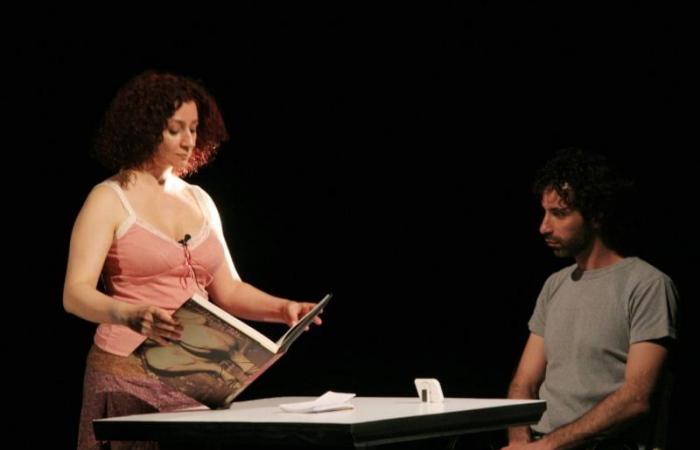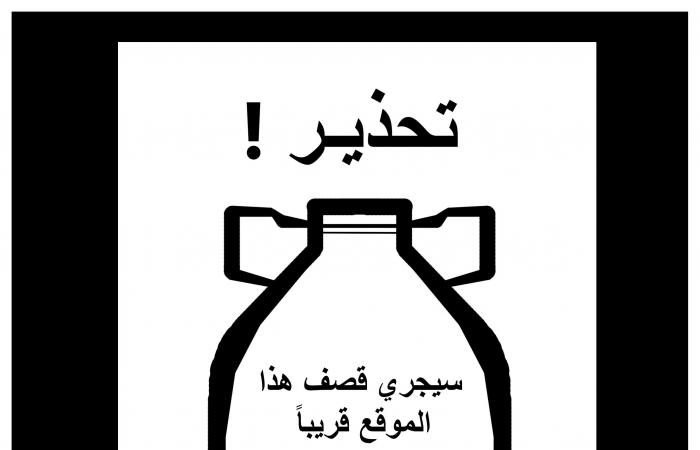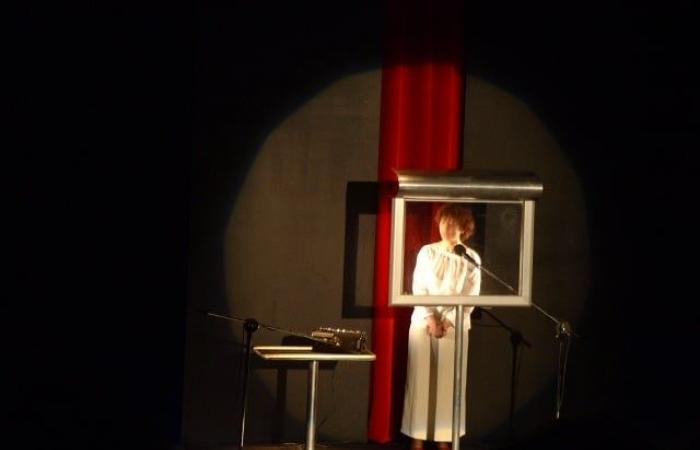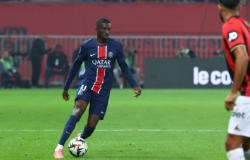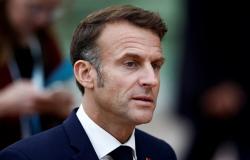We find ourselves at the Coupole of the Théâtre de la Ville overlooking Paris, in the room where Lina Majdalanie and Rabih Mroué give one of their shows on the program of the Autumn Festival. First question: “How are you?” » But how to answer it… A new war has just broken out between Israel and Hezbollah. We ask about friends, relatives, respective families. The worry is there and the fatigue of an always uncertain future.
But as we have known since the time when wars are added to the economic crisis, an aborted revolution, a Dantesque explosion, here we are rolling up our sleeves to get to work as a way of asserting ourselves in life. Let’s talk theater!
“We make theater to invite people to think,” confides Rabih Mroué. Our work is full of doubts. It is full of holes and vacant places where the public is invited to think with us. For me, that’s the function of art to share ideas. »
A theater between reality and fiction
The two artists like to start from real facts and embroider around them, leaving room for imagination. In Who”s Afraid of Representation, they confront presentations of body artthese violent Western performances, signed Marina Abramovic or Orlan among others, to the story of Hassan Ma’moun, a Lebanese official who killed around ten people. A piece like most of their creations which, despite its seriousness, takes place calmly and with a lot of humor. Which brings out the violence of the words better. “Humor helps us with the public to talk about a violent subject with distance without plunging into emotion and pathos,” underlines Rabih Mroué.
A theater which therefore invites reflection, and which often blurs the boundaries between reality and fiction.
“We often start from real facts,” underlines Lina Majdalanie, “but what we are trying to say is that reality comes to us through stories. It is full of fiction, narration, points of view. » Thus, the two artists like to question the history in a country, Lebanon, where the teaching of history stopped before the civil war in 1975. “Each community, each political group tells its own story. »
Rabih Mroué dans « Sand in The Eyes ». Photo Joachim Dette
Their theater also looks at our relationship to images in an era where we are flooded with information. The theater conference Sand in The Eyes which could be translated as Powder in the eyes brings two photos face to face: that of a propaganda image of a terrorist threatening to execute a hostage and that of a drone showing a blurred landscape where bombs are obviously being thrown. Death is present in both images, but with varying representations. If one is crude and immediately arouses rejection, the other, more watered down, is no less violent.
In exile at home and elsewhere
Lina Majdalanie and Rabih Mroué have lived in Berlin for ten years. “I love this city,” admits Lina. It’s cosmopolitan and calm at the same time. » After Beirut, we can understand the two artists’ attraction to calm. Neither of them speaks German. “It’s somewhere lighter,” admits Rabih, deadpan. If someone insults you or says rude things to you, you smile at them! But somewhere you are out of it. Outside of social and political life… and that’s frustrating. »
But the feeling of being foreign is what the two artists already felt in Lebanon and it is one of the reasons why they left. “Little by little, our circle of friends shrank to five, six people. It’s strange to feel like you’re in exile in your own city. »
“Alert, this site will soon be bombed, leave your homes and save your lives”, says this pamphlet presented as part of Rabih Mroué’s performance entitled “Before Falling Seek Assistance of Your Cane”. Courtesy of the Autumn Festival
Since October 7, this intellectual solitude has caught up with them in Berlin. The Western world has become polarized, Germany even more so due to its Nazi past and the Holocaust. The guilt is such that it is impossible to criticize Israel and its bellicose policies. “There is no debate possible. Once again we must take sides. There is no room for nuance,” laments Lina Majdalanie.
Freedom as a battle horse
Their creation Four walls and a roof once again comes from a real fact. This concerns the trial of Bertolt Brecht in the United States in 1947. It took place before the Committee on Un-American Activities responsible for combating communist activism. The German playwright who fled Nazism, dictatorship and a dogmatic regime hoping to find more freedom in the United States finds himself facing a new kind of censorship and repression. “In a way, this echoes our situation,” admits Rabih Mroué. We are of course not comparing ourselves to Bertolt Brecht, what interests us is what is happening today. Brecht’s story is a pretext to talk about our current world. »
In the piece being created, several forms are juxtaposed: theater, reading, performance, archive documents from the trial, concert.
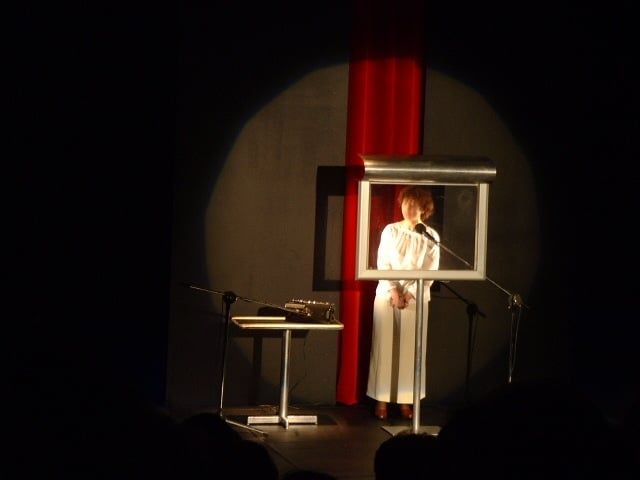 Lina Majdalanie in “Biokhraphia”. Photo Houssam Mcheimech
Lina Majdalanie in “Biokhraphia”. Photo Houssam Mcheimech
The other creation A Little Bit of The Moon or A little bit of moon brings together Rabih Mroué and the great Flemish contemporary Belgian dance choreographer Anne Teresa de Keersmaeker. The piece is built around the dialectical question of light and shadow. There will again be different forms, including dance and theater. “I will dance too and she will do theater,” says Rabih, with a smirk.
In our archives
THEATER – Sunday evening, show by Lina Saneh and Rabih Mroué at Madina “Biokhraphia”: censorship, lies and video (PHOTOS)
Sacralization is not part of the repertoire of Rabih Mroué and Lina Majdalanie. Freedom, on the other hand, is their hobby horse. Lina recently took her mother’s name Majdalanie. “I have always been a feminist. I wanted to pay tribute to my mother. She was a modest and particular woman. She saved our lives, my sisters and me. » Saved from the dominant patriarchal system, Lina continues her path towards freedom. The mop of hair, half silver at the roots, half flaming red, newly freed from the dye. With an Agnès Varda-style air, she defies the years and the passing of time.
Two artists who confront a world of extreme brutality and send it back to us with the gentleness that characterizes them, as food for thought and a questioning of our own responsibility.
The Autumn Festival, 2024 edition
A multidisciplinary festival born in 1972, the Festival d’Automne à Paris puts theater, music, dance, visual arts and cinema at the forefront. Its 2024 edition presents 84 projects in theater, dance, music, visual arts and performance in 60 partner locations (31 in Paris and 29 in Île-de-France). This edition combines large-scale projects and discoveries of young international and French creation, offering 530 performances from September to December, for a capacity of nearly 200,000 seats. It is marked by two “Portraits”: one dedicated to the authors and directors Lina Majdalanie and Rabih Mroué, major figures of contemporary Lebanese creation, as well as to the Italian composer and conductor Clara Iannotta. On the occasion of Lithuania’s cultural season in France, a “Focus” dedicated to Lina Lapelytė highlights two of her works, including a creation including the participation of 200 children. Another three-part “Focus” highlights Thai director Apichatpong Weerasethakul at the Center Pompidou, which presents an exhibition, a performance and a complete retrospective of his films. This edition pays attention to diversity and parity among the invited artists. Artists from the Middle East and North Africa occupy an important place, with carte blanche given to the Tunisian Dream City festival and the invitation extended to the Jordanian artist Lawrence Abu Hamdan, the Iranian artists Gurshad Shaheman and Sorour Darabi or the Moroccan choreographer Radouan Mriziga presenting 3 pieces over the entire duration of the festival. The festival strengthens its support for the production of international artists, including the trilogy Bitch Strength by Brazilian director Carolina Bianchi, who will present her entire project by 2026. The research collectives Forensic Oceanography, Border Forensics and Liminal present “From Sea to Sky”, a multimedia installation exposing border violence at sea. In total, 28 countries are represented. Twenty-two projects are carried out by artists and collectives invited for the first time to the festival, including the Lebanese Ali Cherri, Ligia Lewis, Rosana Cade and Ivor McAskill, Soa Ratsifandrihana and Joël Pommerat. Large-format, European and international pieces including Robert Wilson, Marlene Monteiro Freitas, Anne Teresa De Keersmaeker and Radouan Mriziga, Jan Martens and Romeo Castellucci. The music program is composed of works by Heiner Goebbels, George Benjamin, Jérôme Combier and continues the Licht cycle by Karlheinz Stockhausen.
An appointment not to be missed
As part of the “Portrait” dedicated to Lina Majdalanie and Rabih Mroué, the next shows are: Borborygmus at the Silvia Monfort theater, with Mazen Kerbaj, from Wednesday October 16 to Friday October 18; Photo–Romance at the Cité Internationale theater, from Tuesday October 22 to Friday October 25; Biokhraphia : Riding On a Cloud at La Commune, CDN d’Aubervilliers, from Wednesday November 13 to Saturday November 16; Before Falling Sick, the Assistance of Your Cane, Anywhere, Appendixat the Cartier Foundation for Contemporary Art, from Monday November 18 to Monday December 2; 33 turns and a few seconds at the Rond-Point theater, from Friday November 22 to Sunday November 24 ; Four walls and a roof at CentQuatre-Paris, from Wednesday December 4 to Sunday December 8; A Little Bit of The Moon, with Rabih Mroué and Anne Teresa De Keersmaeker, Fondation Fiminco, from Monday 16 to Friday 20 December. Furthermore, Ali Cherri presents The Book of Mud at Librairie 7L, Saturday October 19.
As for Lawrence Abu Hamdan, he presents Zifzaafa from Saturday October 19 to Thursday October 10 at CentQuatre-Paris, then Air Pressure at Espace Niemeyer on Monday October 7 and Tuesday October 8.
We find ourselves at the Coupole of the Théâtre de la Ville overlooking Paris, in the room where Lina Majdalanie and Rabih Mroué give one of their shows on the program of the Autumn Festival. First question: “How are you?” » But how to answer it… A new war has just broken out between Israel and Hezbollah. We ask about friends, relatives, families…
- -
